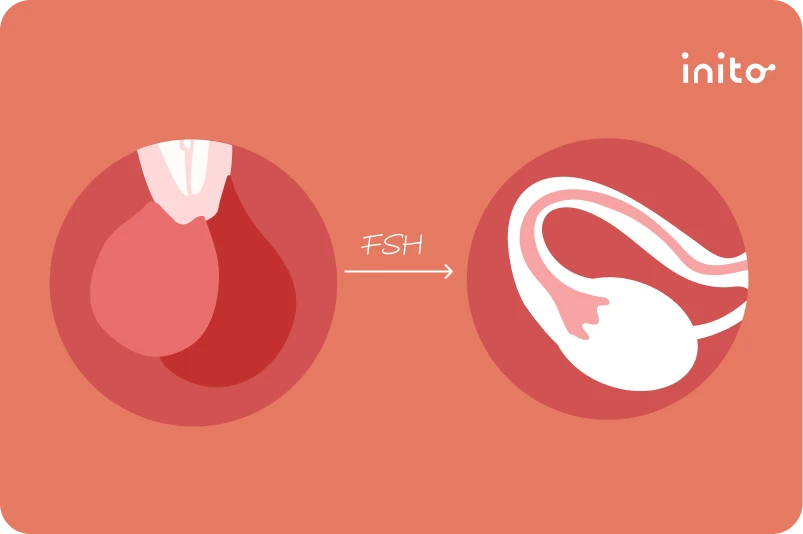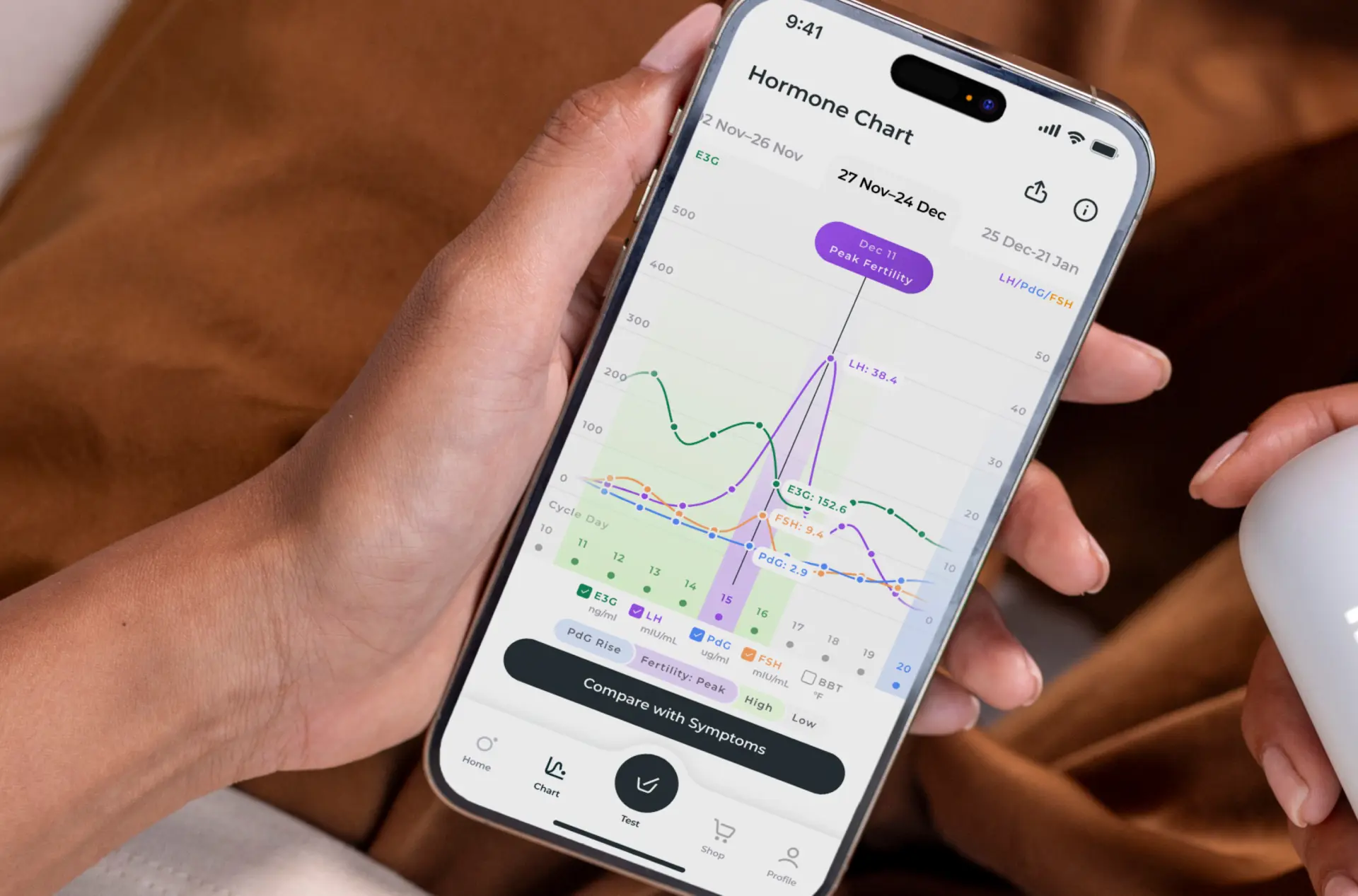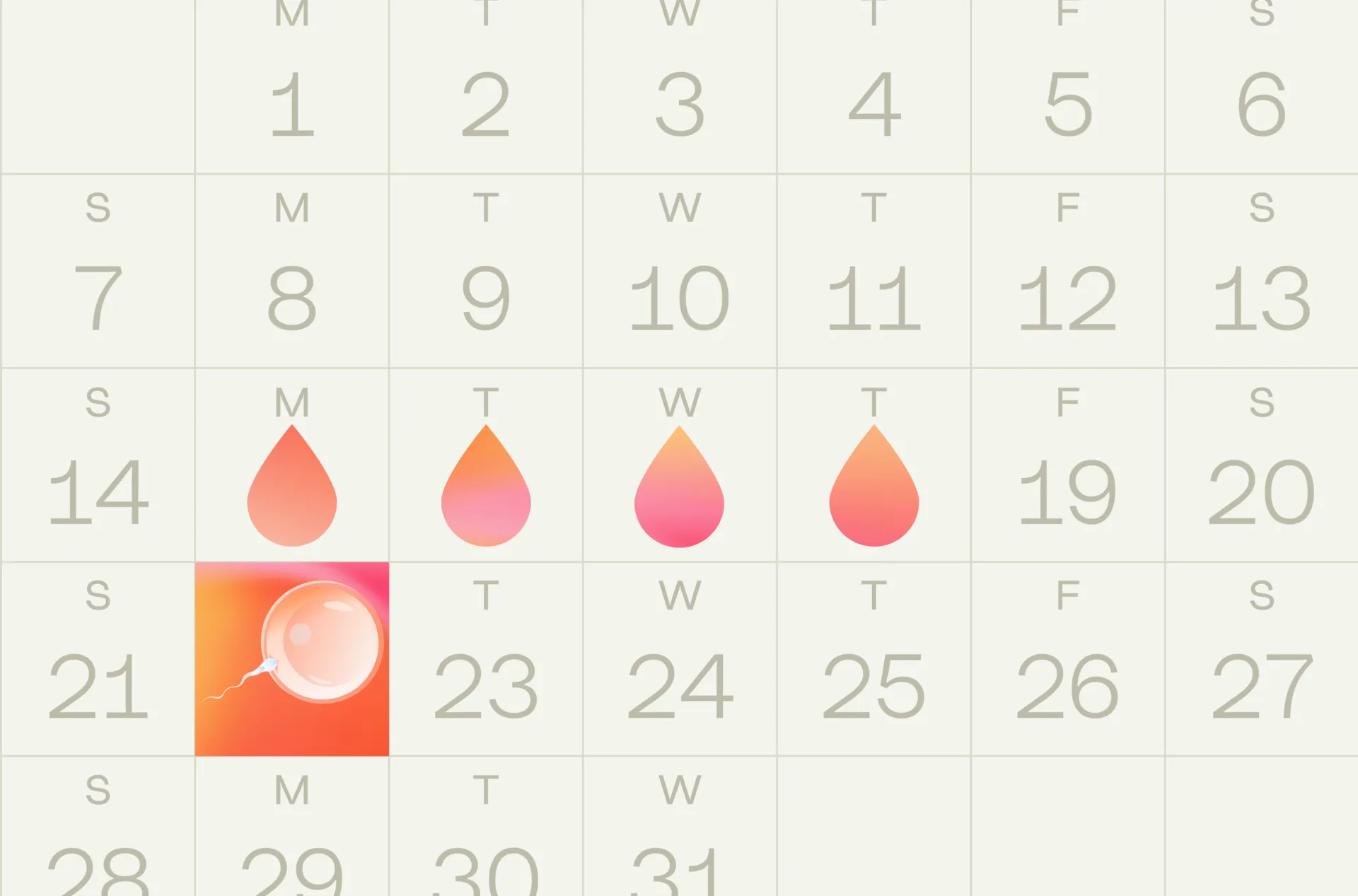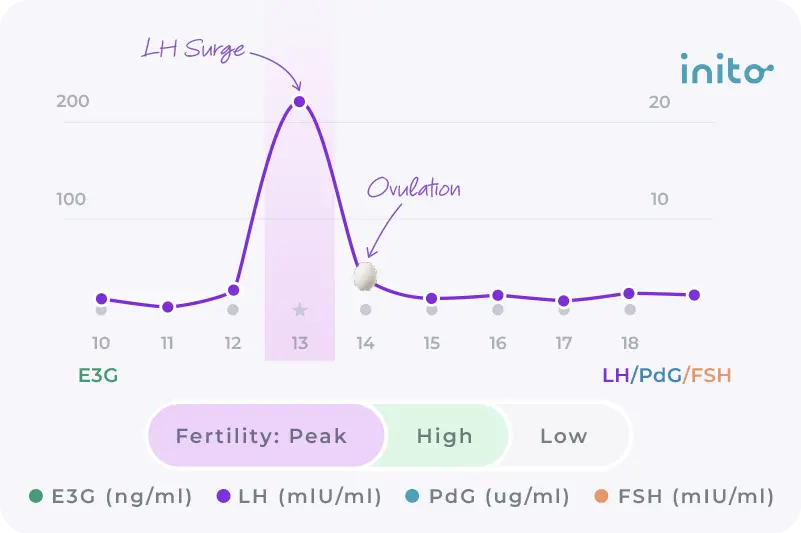Content table
Have you ever wondered how your body controls reproduction? The FSH (Follicle-Stimulating Hormone) is an essential factor in this process for both men and women. FSH enhances the formation of ovarian follicles in females, whereas it promotes sperm production in males.
If you’ve been struggling with fertility or noticed unexpected changes in your body, understanding FSH and its effects on your hormones could provide some valuable insights into your reproductive health.
This blog will help you to know what this hormone does to your body and why it is essential for fertility.
So, here are the key takeaways about FSH and reproductive health:
Takeaways
Here’s a quick recap of what we’ve covered:
- FSH levels are a crucial part of understanding fertility and reproductive health.
Both high and low FSH levels can point to different health conditions that affect your ability to conceive. - Testing FSH levels through blood or urine is an essential step in diagnosing fertility issues.
- If you have abnormal FSH levels, consult a doctor who can help you with the right treatments or solutions.
- FSH abnormalities don’t always mean infertility, but they are necessary signals that something might be off with your reproductive system.
What is FSH, and why is it important?

FSH, or Follicle-Stimulating Hormone, is a hormone secreted by the pituitary gland near the brain’s surface. It’s a crucial part of the reproductive system, playing key roles in both males and females.
In women, abnormal FSH levels can indicate problems with fertility, menopause, or ovarian disorders. In men, low FSH levels can point to issues with sperm production or testicular function.
If FSH levels are off, it can affect fertility, hormone balance, and overall reproductive function, making it an essential marker for various health conditions.
FSH is essential for the proper functioning of your reproductive system. Think of it as your “reproductive coach.”
How does FSH affect women’s reproductive health?

Follicle-stimulating hormone (FSH) is vital in a woman’s reproductive health by regulating key processes like the menstrual cycle and ovulation. Here’s how it works:
Functions of FSH in menstruating women
Stimulates follicle growth
At the start of each menstrual cycle, the pituitary gland releases FSH to signal the ovaries to begin growing follicles. These are tiny sacs that contain immature eggs. FSH encourages several follicles to start developing, but typically, only one becomes “dominant” and continues to mature.
Egg maturation and estrogen production
As the follicles grow, they start producing estrogen. This hormone helps thicken the uterus lining in preparation for a possible pregnancy. The rise in estrogen also signals the pituitary gland to reduce FSH production, preventing multiple follicles from maturing at once.
Functions of FSH in men

FSH promotes sperm production in men’s testes. It works with another hormone, luteinizing hormone (LH), to assist the testes in producing testosterone, which is essential for sperm formation. FSH aids in maintaining a consistent supply of sperm by working on the Sertoli cells in the testes, which nourish and nurture the developing sperm.
Just as a spark ignites a fire, certain factors can trigger changes in your FSH levels.
A hormone called GnRH triggers the FSH Hormone. The hypothalamus in the brain releases GnRH, and it tells the pituitary gland to start producing FSH. It signals the ovaries in women to start growing follicles and the testes to make sperm in men.
Any imbalance in FSH levels can disrupt these processes, which is why it’s often measured when assessing fertility or menstrual issues.
Find this article related: What Your FSH & LH Ratio Says About Your Fertility?
So, how are the FSH levels measured for fertility?
Doctors typically perform a blood or urine test to measure FSH levels for fertility. These tests help assess how well the reproductive system is functioning and can give insight into issues with ovulation, menopause, or other hormonal imbalances. Typical values of Follicle-Stimulating Hormone (FSH) in blood and urine vary based on age, sex, and the menstrual cycle phase. Normal FSH Levels in Blood
Typical values of Follicle-Stimulating Hormone (FSH) in blood and urine vary based on age, sex, and the menstrual cycle phase. Normal FSH Levels in Blood
For women
- Follicular Phase (Day 1-14): 3.0 to 9.0 mIU/mL
- Ovulation Phase (Mid-Cycle): 4.7 to 21.5 mIU/mL
Luteal Phase (Days 15-28): 1.7 to 7.7 mIU/mL - Postmenopausal: 25.8 to 134.8 mIU/mL
Normal FSH Levels in Urine
- values between 7 and 11.9 mIU/mg are often considered normal for women of reproductive age.
- Levels below 7 mIU/mg or above 12 mIU/mg creatinine may indicate potential fertility issues, although these findings are not universally significant across all studies.
For men
- Normal levels are lower for men, around 1.5 to 12.4 mIU/mL.
Here comes Inito with the ability to track your four key fertility hormones on a single strip, such as LH, estrogen, and FSH, to track your fertile window, and PdG confirms ovulation.
Tracking FSH levels acts like a compass, guiding you, but when they go off balance, they can signal health issues.
What do abnormal FSH levels mean in women's fertility?
When FSH levels go off-balance, they can be associated with various reproductive and non-reproductive conditions. Here’s a breakdown of the key conditions linked to abnormal FSH levels in women:
Indicators of high FSH levels

If your FSH levels are higher than normal it could indicate a few things:
- Perimenopause or Menopause: As menopause approaches, your ovaries gradually produce fewer eggs, which leads to rising FSH levels. This increase can trigger symptoms like hot flashes, night sweats, and irregular periods.
- Primary Ovarian Insufficiency (POI): This happens when the ovaries stop functioning early, before menopause. It can also cause missed or irregular periods, making conceiving harder.
- Unresponsive Ovaries: In some cases, the ovaries may be unresponsive to the signals from FSH. This condition is called ovarian resistance, where the ovaries do not react appropriately to FSH despite its elevated levels. It results in infertility or irregular cycles because the eggs do not mature properly.
- Pituitary Gland Disorders (Including Pituitary Tumors): Since the pituitary gland produces FSH, disorders that affect this gland, such as pituitary tumors, can lead to abnormally high FSH levels. This pituitary tumor causes the gland to release excessive amounts of FSH, disrupting the balance of reproductive hormones. These tumors can also affect other hormones like LH (Luteinizing Hormone) and cause fertility problems.
Possible causes of low FSH levels

High FSH levels often link to reproductive issues; low FSH levels (below four mIU/mL) can also point to problems. Low FSH levels may indicate:
- Hypogonadotropic Hypogonadism: This condition happens when your pituitary gland doesn’t produce enough hormones, including FSH. It affects both men and women, leading to delayed puberty, infertility, and other health issues.
- Eating Disorders: Conditions like bulimia or anorexia can throw off your hormone balance, leading to low FSH levels and irregular periods.
Find this article related: follicle-stimulating hormones & How to reduce high FSH levels and boost your ovarian reserve.
Now that we know what tips the scale, let’s explore how these imbalances show in your body.
Why should you get an FSH test?

Getting an FSH test is a smart move if you’re curious about your reproductive health. FSH stands for Follicle-Stimulating Hormone, and it significantly regulates your menstrual cycle and fertility.
Here’s why you might want to get tested:
Irregular or absent periods
If your menstrual cycle has become a bit unpredictable, maybe your periods are irregular, or you’ve even missed a few, it’s a good idea to consider testing your FSH. Abnormal menstruation patterns might indicate a variety of underlying disorders, including hormonal imbalances and illnesses like polycystic ovarian syndrome (PCOS).
Difficulty in getting pregnant
Struggling to conceive can be incredibly frustrating, and if you’ve been trying for over a year without success, it might be a good idea to track your FSH, along with other hormone levels.
Early menopause symptoms
If you’re experiencing symptoms that could indicate early menopause, like hot flashes, night sweats, or mood swings, an FSH test can be a helpful tool. As women approach menopause, FSH levels typically rise because the ovaries are producing fewer hormones. If you’re under 45 and noticing these signs, checking your FSH levels can help determine if you’re entering menopause earlier than expected.
Concerns about your reproductive health
Lastly, suppose you have any general concerns about your reproductive health. In that case, an FSH test might be part of the diagnostic process, whether it’s changes in libido, unexplained weight loss, or fatigue. Sometimes, these symptoms can relate to pituitary gland disorders or other hormonal imbalances that affect FSH production.
With your FSH levels on the radar, the next question is,
Can I get pregnant with abnormal FSH levels?
It’s possible to get pregnant with abnormal FSH levels, but it may take a little more effort and guidance from your doctor. FSH plays a crucial role in egg production, so when its levels are too high or too low, it can impact your fertility.
Here’s what you need to know:
Symptoms Matter:
Doctors don’t just look at your FSH levels. They consider your symptoms and other test results to picture your fertility better. For example, if you have high FSH and menopausal symptoms like irregular periods or mood swings, it might indicate that your ovaries are winding down. However, low FSH could signal PCOS (with symptoms like acne, irregular periods, or weight gain) or a pituitary issue (which could cause headaches, fatigue, or vision problems).
Next Steps with Your Doctor:
Whether your FSH is high or low, discussing your next steps with your doctor is essential. There are treatments available that can help regulate FSH levels and improve fertility, even if things seem a little out of balance.
Abnormal FSH levels don’t close the door on pregnancy; they mean you may need a little extra help to get things on track.
Therefore, while abnormal FSH levels can pose challenges, it certainly does not signify the end of the road.

FAQs
Yes, stress can impact your hormone levels, including FSH. Stress stimulates the production of cortisol, which can interfere with your body’s natural hormone balance and possibly lead to irregular FSH levels. It’s essential to manage stress for overall hormonal health.
Yes, as you get older, your FSH levels naturally change. In women, FSH levels go up as they get closer to menopause, usually in their late 40s or early 50s. Although FSH levels in men may also fluctuate significantly with age, they tend to stay more constant.
Normal FSH levels vary throughout a woman’s menstrual cycle and can change with age. However, generally, a baseline range of 4.7 to 21.5 mIU/mL is considered normal for women of reproductive age.












